#nonbinary language
Explore tagged Tumblr posts
Text
something something everyone wants nonbinary terminology that sounds natural but no one wants to use new terminology enough to naturalize it. idk to tell y'all this but new words are always going to sound weird until they don't. nonbinary people are gonna continue to be alienated by language until we pussy up!! also tbh i feel like some people just think any terminology that is blatantly tied to nonbinary people is cringe by virtue of exorsexism making all nonbinary things cringe
14K notes
·
View notes
Note
Hello! I have a question. What does “enben” mean? Is it a replacement for “enby”?
Hi! Good question!
Enben is the plural of enban, the non-binary gendered equivalent of man/woman. It is derived from the term enby. I prefer to use it because enby was initially understood to be a term that referred to non-binary youth. Whilst not everyone uses it that way, I personally prefer to use enban to describe all non-binary people to both show enben that there is more vocabulary to describe ourselves, but also to subtly uninfantilise non-binary people. Enban is a more adult feeling option. It also helps popularise these terms so other enben as well as binary people are aware of nonbinary vocabulary.
Hopefully that was helpful 😌
#enban#enby#enbies#enben#nonbinary language#nonbinary terminology#nonbinary vocabulary#nonbinary#genderqueer#asks#💛🤍💜🖤
723 notes
·
View notes
Text
A List of Gender Terms !
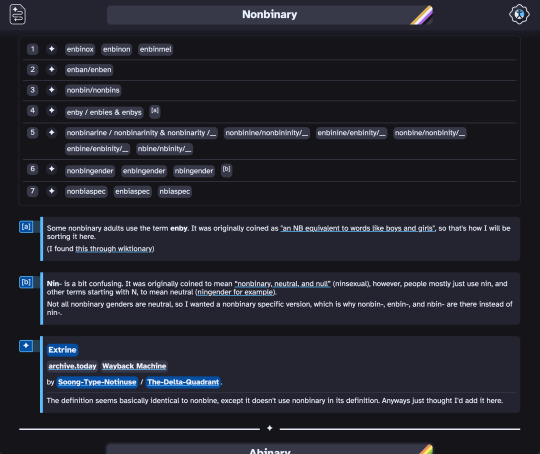

So I disappeared for 2 months, but I finally completed this project! :D (Though I've been making some random posts talking about it, so it's not like I was really gone, or what I was working on wasn't obvious.)
It started off as me having trouble keeping track of a couple gender terms (and also not knowing they existed before, since I've never really seen people talk about them), then I thought I should make a list, and if I was going to do that I might as well post it to help other people too. Which I started out trying to make that list on Tumblr, but I found it too limiting so I moved to google docs, which I also found too limiting (I just couldn't achieve my vision, if you will), and now I know html and css.
As usual, I kinda overdid it, but I think I should be a little proud of myself. I had 0 knowledge of html and css, and 2 months later I've made my own website. (I could have made it much quicker, but I often had to take breaks, a bit overwhelmed by all that new stuff.)

Anyways, it has a ton of terms on there.
I have sections for nonbinary, abinary, midbinary, atrinary, midtrinary, androgyne, agender, neutrois, maverique, ilyagender, aporagender, outherine, kenochoric, and xenogender.
For 7 categories (sex terms, adult, general term, child, gender quality, gender-quality-in-nature genders, and spectrum / -iagender spectrum).
And they all have sources on both Archive Today, Wayback Machine, and if still existing, the original post too. (At least to the best of my abilities, and there are a couple of exceptions that I couldn't figure out.)

I did put effort into this, but it's possible I missed something. So if I made a mistake anywhere, or if anyone has any extra information to add on, or if you just have some comments, you can tell me. My ask box is open, but comments on this post would probably be fine too.
Also, I checked on a couple of different browsers, mobile too, and read up on web accessibility and checked and all that (I tried using a screen reader, I'm not a pro at it though, so it's possible I may have missed something obvious), so I hope the website itself is useable. But if there's any bugs there, just tell me (it'll be appreciated).

I'm also thinking of making another compilation, but for flags (for all of the terms listed here), and maybe orientations too, but maybe later haha
I also don't know how to write a image id for the top picture, if anyone wants to write to one I'll add it.
-
Below the cut is a short little video scrolling through the site.
#compilation post#pride#nonbinary#abinary#midbinary#atrinary#midtrinary#androgyne#agender#neutrois#maverique#ilyagender#aporagender#outherine#kenochoric#xenogender#nonbinary language#it's hosted on neocities
214 notes
·
View notes
Text
People will say damn near anything aside from "nonbinary" or "bigender" or "androgyne" or "maverique" or "neuter" or "neutrois" or "agender" or "genderfluid" or any other not binary gender
#it pisses me off#exorsexism#nonbinary#androgyne#bigender#maverique#genderfluid#agender#neuter#neutrois#nonbinary terminology#nonbinary language#nonbinary pride#nonbinary life#neometrocosmos
10 notes
·
View notes
Note
Bonjour! Je voulais juste vous demander (et aussi demander vos abonnés) comment dire iel (où they) en allemand et en russe. Je suis en train d’apprendre les deux et comme j’utilise iel/they en français/anglais, je voulais vraiment savoir comment faire la même en allemand et en russe. Désolé si vous n’êtes pas qui je devais demander, je sais que c’est parfois très compliqué et parfois il y a beaucoup de réponses. Merci tellement!
Что такой “they” (местоимение) по русский? Я изучаю русский язык и я хочу знать. Это «они» или что-то другое? Спасибо!!
Ich möchte gern wissen wie sagt man „they“ auf Deutsch. Vielen Dank!
(ask from spyld 2023)
Nice question!! So I'm throwing it open to other languages too!
How to be gender neutral in x language??
#nonbinary language#nonbinary#spyld posts#genderqueer#non binary#spyld#enby#gendered language#language#german#russian#french#love for iel en français btw :)
86 notes
·
View notes
Text
The Mgs. Pendragon when we're in the same room. And you can just use the same word instead of "sir" or "ma'am". Yes, mage. No, mage. I'll see to it, mage.
I'm in!
since mrs, ms, and mr are all descended from the latin word magister, i propose the gender neutral version should be mg, short for "mage"
#nonbinary#language#enby#nonbinary language#gender agnostic language#honorifics#gender agnostic honorifics
122K notes
·
View notes
Text
Gendered pronouns in Japanese vs English
In Revolutionary Girl Utena, the main character Utena is a girl (it says so in the title), but very conspicuously uses the masculine first person pronoun 僕 (boku) and dresses in (a variation of) the boys school uniform. Utena's gender, and gender in general, is a core theme of the work. And yet, I haven’t seen a single translation or analysis post where anyone considers using anything other than she/her for Utena when speaking of her in English. This made me wonder: how does one’s choice of pronouns in Japanese correspond to what one’s preferred pronouns would be in English?

There are 3 main differences between gendered pronouns in Japanese vs English
Japanese pronouns are used to refer to yourself (first-person), while English pronouns are used to refer to others (third-person)
The Japanese pronoun you use will differ based on context
Japanese pronouns signify more than just gender
Let’s look at each of these differences in turn and how these differences might lead to a seeming incongruity between one’s Japanese pronoun choice and one’s English pronoun choice (such as the 僕 (boku) vs she/her discrepancy with Utena).
Part 1: First-person vs third-person
While Japanese does technically have gendered third person pronouns (彼、彼女) they are used infrequently¹ and have much less cultural importance placed on them than English third person pronouns. Therefore, I would argue that the cultural equivalent of the gender-signifying third-person pronoun in English is the Japanese first-person pronoun. Much like English “pronouns in bio”, Japanese first-person pronoun choice is considered an expression of identity.
Japanese pronouns are used exclusively to refer to yourself, and therefore a speaker can change the pronoun they’re using for themself on a whim, sometimes mid-conversation, without it being much of an incident. Meanwhile in English, Marquis Bey argues that “Pronouns are like tiny vessels of verification that others are picking up what you are putting down” (2021). By having others use them and externally verify the internal truth of one’s gender, English pronouns, I believe, are seen as more truthful, less frivolous, than Japanese pronouns. They are seen as signifying an objective truth of the referent’s gender; if not objective then at least socially agreed-upon, while Japanese pronouns only signify how the subject feels at this particular moment — purely subjective.
Part 2: Context dependent pronoun use
Japanese speakers often don’t use just one pronoun. As you can see in the below chart, a young man using 俺 (ore) among friends might use 私 (watashi) or 自分 (jibun) when speaking to a teacher. This complicates the idea that these pronouns are gendered, because their gendering depends heavily on context. A man using 私 (watashi) to a teacher is gender-conforming, a man using 私 (watashi) while drinking with friends is gender-non-conforming. Again, this reinforces the relative instability of Japanese pronoun choice, and distances it from gender.

Part 3: Signifying more than gender
English pronouns signify little besides the gender of the antecedent. Because of this, pronouns in English have come to be a shorthand for expressing one’s own gender experience - they reflect an internal gendered truth. However, Japanese pronoun choice doesn’t reflect an “internal truth” of gender. It can signify multiple aspects of your self - gender, sexuality, personality.
For example, 僕 (boku) is used by gay men to communicate that they are bottoms, contrasted with the use of 俺 (ore) by tops. 僕 (boku) may also be used by softer, academic men and boys (in casual contexts - note that many men use 僕 (boku) in more formal contexts) as a personality signifier - maybe to communicate something as simplistic as “I’m not the kind of guy who’s into sports.” 俺 (ore) could be used by a butch lesbian who still strongly identifies as a woman, in order to signify sexuality and an assertive personality. 私 (watashi) may be used by people of all genders to convey professionalism. The list goes on.
I believe this is what’s happening with Utena - she is signifying her rebellion against traditional feminine gender roles with her use of 僕 (boku), but as part of this rebellion, she necessarily must still be a girl. Rather than saying “girls don’t use boku, so I’m not a girl”, her pronoun choice is saying “your conception of femininity is bullshit, girls can use boku too”.

Through translation, gendered assumptions need to be made, sometimes about real people. Remember that he/they, she/her, they/them are purely English linguistic constructs, and don’t correspond directly to one’s gender, just as they don’t correspond directly to the Japanese pronouns one might use. Imagine a scenario where you are translating a news story about a Japanese genderqueer person. The most ethical way to determine what pronouns they would prefer would be to get in contact with them and ask them, right? But what if they don’t speak English? Are you going to have to teach them English, and the nuances of English pronoun choice, before you can translate the piece? That would be ridiculous! It’s simply not a viable option². So you must make a gendered assumption based on all the factors - their Japanese pronoun use (context dependent!), their clothing, the way they present their body, their speech patterns, etc.
If translation is about rewriting the text as if it were originally in the target language, you must also rewrite the gender of those people and characters in the translation. The question you must ask yourself is: How does their gender presentation, which has been tailored to a Japanese-language understanding of gender, correspond to an equivalent English-language understanding of gender? This is an incredibly fraught decision, but nonetheless a necessary one. It’s an unsatisfying dilemma, and one that poignantly exposes the fickle, unstable, culture-dependent nature of gender.

Notes and References
¹ Usually in Japanese, speakers use the person’s name directly to address someone in second or third person
² And has colonialist undertones as a solution if you ask me - “You need to pick English pronouns! You ought to understand your gender through our language!”
Bey, Marquis— 2021 Re: [No Subject]—On Nonbinary Gender
Rose divider taken from this post
#langblr#japanese#japanese language#language#language learning#linguistics#learning japanese#utena#revolutionary girl utena#shojo kakumei utena#rgu#sku#gender#transgender#nonbinary#trans#official blog post#translation#media analysis
3K notes
·
View notes
Text
Please stop forgetting nonbinary people!
Theyfab isn't a transmasc-specific slur. It's always been used against any nonbinary person assumed to be AFAB.
Though the AGAB of nonbinary people is nobody's business in the first place, it bears repeating that not every AFAB nonbinary person is transmasculine, just as not every AMAB nonbinary person is transfeminine.
These bigots aren't just transphobic towards trans men/mascs, they're exorsexist as well. We'll be stronger if we stick up for each other and push back against them together!
Edit: Just to make it clear, theyfab is being used against transmascs as well! I just want people to also acknowledge the non-transmasc nonbinary people being hurt.
#transandrophobia#exorsexism#trans unity#theyfab discourse#discourse#many nonbinary people are also transmasc#but afab nonbinary =/= transmasc#why the fuck are these people so obsessed with AGAB language anyway#9 times out of 10 they're intersexist as well#note i said “assumed to be afab”#assholes still use it against nonbinary people who were amab as well
594 notes
·
View notes
Text
A reminder that gender neutral ≠ androgynous ≠ nonbinary. These things can overlap for people, and in life, but they are distinct concepts that should be noted as such.
#something that was frustrating me#gender neutral#transneutral#transneu#transandrog#transandrogyny#transandrogynous#transneutrality#nonbinary language#nonbinary presentation#nonbinary#genderqueer#💛🤍💜🖤
96 notes
·
View notes
Text
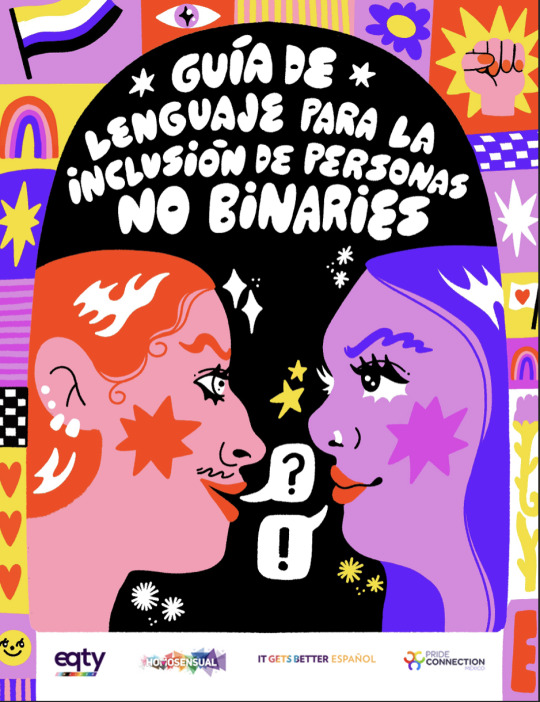
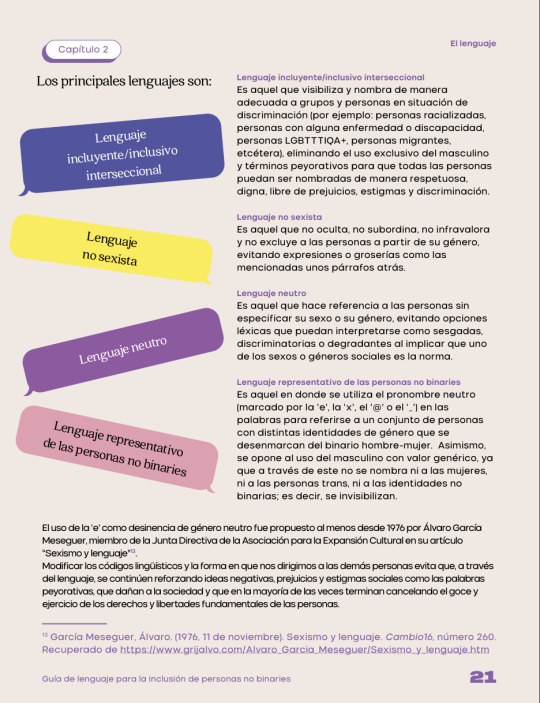

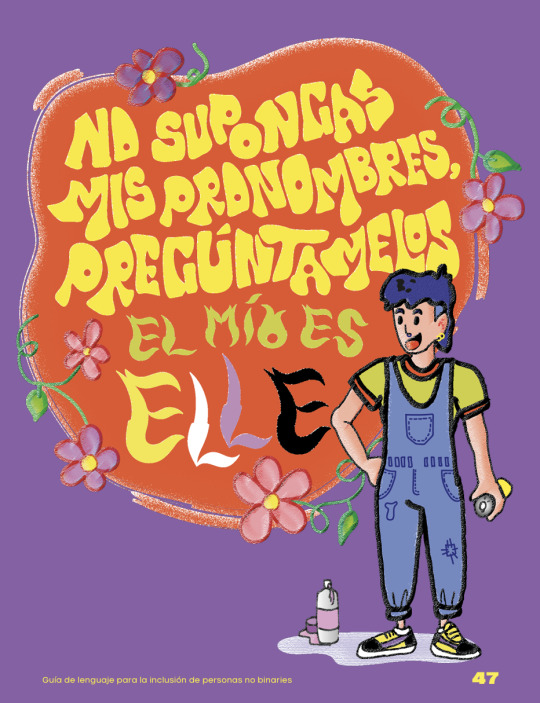
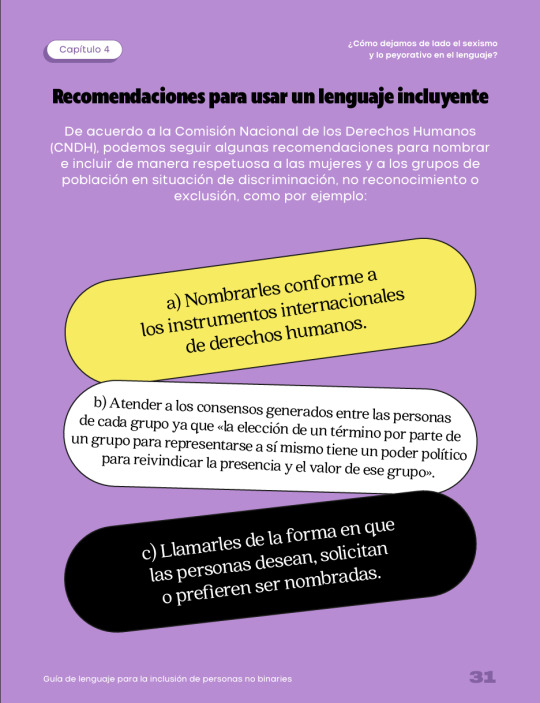
FREE downloadable guide to nonbinary language in Spanish - spread the word! 💛🤍💜🖤
How do we take a traditionally gendered language like Spanish and adapt it to be more gender inclusive?
Language is a powerful tool - this new EduGuide is amplifying non-binary voices, dismantling stigmas, and teaching us how to take a traditionally gendered language and adapt it to be more inclusive.
Our pals at It Gets Better Mexico collaborated with Homosensual to address this crucial issue within the language — download their guide for FREE and share it around to friends, family, your school, and your community: itgetsbetter.org/blog/spanish-eduguide-for-the-inclusion-of-nonbinary-people
Education like this helps create a space where every identity is seen and celebrated!
---------
El lenguaje es una herramienta poderosa - esta nueva EduGuide amplifica las voces no binaries, desmantela los estigmas y nos enseña cómo tomar un lenguaje tradicionalmente basado en género y adaptarlo para que sea más inclusivo.
Nuestres amigis de It Gets Better México colaboraron con Homosensual para abordar este tema crucial dentro del idioma — descarga tú guía GRATIS y compártala con amigues, familiares, tú escuela y tú comunidad para participar en estas importantes conversations: itgetsbetter.org/blog/spanish-eduguide-for-the-inclusion-of-nonbinary-people
¡Una educación como esta ayuda a crear un espacio donde se ve y se celebra cada identidad!
#itgetsbetter#homosensual#nonbinary#enby#genderqueer#gender neutral#gendered language#pronouns#spanish language#no binario#no binarie#latine#lgbtqia
5K notes
·
View notes
Text
linguistics study: genderqueer / nonbinary Arabic speakers wanted!
Do you speak Arabic? Are you trans, nonbinary, genderqueer, gender fluid, or otherwise gender non-conforming?
Please consider taking this 9-question survey to help us create free materials for teaching Arabic.
Please share widely 💜 (Note from synticity: I'm sharing this survey from Kris Knisely on bsky!)
#linguistics#lingblr#queer linguistics#language#arabic#lgbtq linguistics#language learning#language teaching#queer#nonbinary#genderqueer
444 notes
·
View notes
Text
#nonbinary#trans#transmasc#disabled#aac#aac device#aac user#trans positivity#trans pride#transgender#gender affirming care#gender queer#lgbt#lgbtqia#lgbtq community#lgbtq#lgbt pride#disability#top surgery#accesibility#caregiver#sign language#queer#queer pride#t4t#ftm t4t#recovery#top surgery results#top surgery recovery#ftm
475 notes
·
View notes
Text
These are ones I like in place of Ms. and Mr. and Mrs. which I think could also work in place of sir and ma’am.
I’ve seen someone suggest Mage, and I am not sure if it was meant in a joking-but-actually-yes way or if it was because Ms. and Mr. and Mrs. originate from the word magistrate. I know the person I saw suggest Mage was the one who explained the origins from the word magistrate thing and how Mage could easily come from that too, but I just can’t remember more specifically if it was being said in a more serious way or a more joking way. Regardless, I do like that one in place of Ms. Mr. or Mrs. It could be written as Mg.
I always liked the idea of Mist. It combines all of them as well as sounds like them so it fits the pre-established theme, and it’s also nature-y sounding which is just a plus. It could be written as Mst.
I think they also just sound good too.
“Oh, excuse me, mist.”
“Let me get the door for you, mage.”
“Hi, Mg. Johnson, how are you today?”
“Mst. Williams will be your substitute teacher today.”
Just me, but I think they work well in both contexts and those are ones I would love to someday get people to use for me. In the meantime, Mr. is fine and honestly I do love being called sir, so I would mostly want my suggestions to be used with my last name.
When somebody asks “How do I refer to a non binary person formally instead of sir or ma’am” and you answer “do not refer to me” that doesn’t answer their question actually
#smol bean rambles#smol bean thoughts#smol bean rambles queer things#smol bean rambles trans things#nonbinary language#gender neutral language#nonbinary#trans nonbinary#non binary#gender neutral
10K notes
·
View notes
Text
Anon (they/them) is fine with these terms, but wonders if they're an outlier for that.
Edit: updated with a "no" option!
–
We ask your questions anonymously so you don’t have to! Submissions are open on the 1st and 15th of the month.
#polls#incognito polls#anonymous#tumblr polls#tumblr users#questions#polls about language#submitted april 1#polls about lgbtq stuff#lgbtq#gender#nonbinary#trans#transgender#gender neutral
287 notes
·
View notes
Text
really enjoying the idea of stealth-trans!Wilson trying to be supportive of a trans duckling without explicitly outing himself, but fumbling and doing such a bad job that he comes across as mildly transphobic
everything he says is digging himself a deeper hole, to the point where he has to come out as trans, but at that point, the duckling low-key thinks he's lying so he doesn't sound as bad
#he is tripping and stumbling over his words so bad#he also doesnt know any/many trans people so his language is stuck in the 90s and he keeps saying outdated terms#he straightup does not know what being nonbinary is (but once he finds out i like to think he vibes with it and goes from he/him to he/they#house md#my posts#james wilson#malpractice md#hatecrimes md#trans james wilson#housefic
535 notes
·
View notes
Text
the larger group seems to have been flirting with "boss", "chef", and "my liege" as of late
guys what is the gender neutral term for ma’am/sir cus I like saying ma’am/sir jokingly to my friends and I need to know what the gender neutral equivalent is so I can do my part in helpin the gendern’ts feel not-left-out 😓😓😓
28 notes
·
View notes